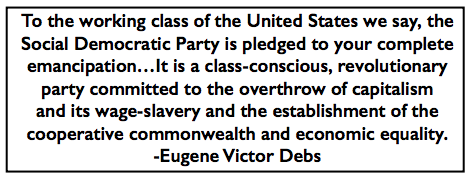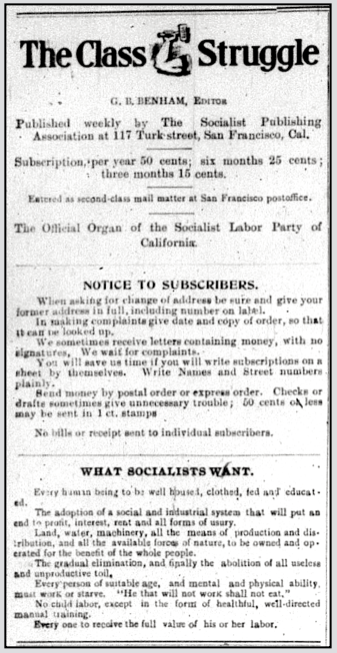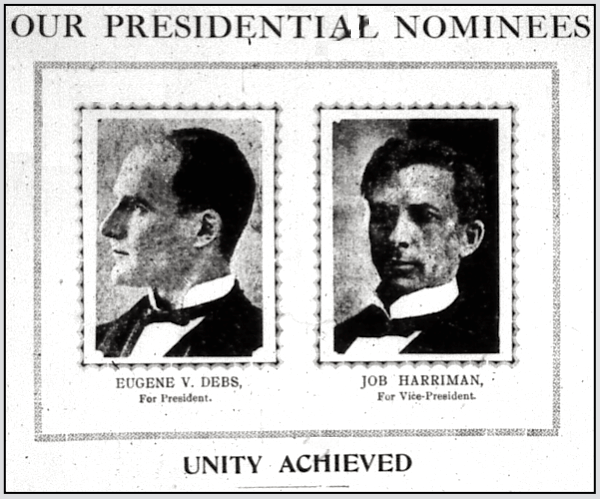 ———-
———-
Hellraisers Journal – Sunday March 18, 1900
San Francisco’s Class Struggle of March 17th Claims “Unity Achieved”
The first national convention of the Social Democratic Party of America was called to order Tuesday morning, March 6, 1900 by Chairman Jesse Cox, at Reichwein’s hall, Indianapolis, Ind. The Class Struggle of March 17th, official organ of the Socialist Labor Party of California, described the convention in detail in an article written by Editor G. B. Benham.
[Part I of II.]
At 10 o’clock am Tuesday, March 6th, the convention was called to order and William Mailly, editor of the Haverhill Social Democrat, was elected chairman. Strickland was made secretary and Johnson of Chicago and Val Putnam of St. Louis assistant secretaries.
The usual committees were appointed, and an order of business was adopted. The credentials committee had an amount of work that does not usually fall to such committees, for the arrangement and basis of representation is not of the character generally used in representative bodies. Any number of members may sign the credentials of a delegate and his vote in the convention is the vote of the number who signed the credentials. Any local organization can thus send as many delegates as they desire. In fact a member can send himself, sign his own credentials, and his voice is recorded as one vote on the floor of the convention, but the vote depends entirely upon the number of signers of the credentials. Thus Margaret Haile has 196 votes, and Martin of Ohio has 1 vote.
The total number of delegates present was 67, representing 17 states, showing total membership represented 2,043.
Officers and committees have always been elected. The traditions and practices of socialist organizations was departed from in the appointment by the chairman of two of the committees. A special committee of three on reception (having in view the receiving of the special committee on unity from the Rochester convention) was appointed (by the direction of the convention) by the chairman. Eugene V. Debs, Victor Berger, and J.F. Carey were appointed. When the time came for the selection of the committee on trades unions, Chairman Mailly requested that he be allowed to appoint, and his request was unanimously granted.
The reports of the National Committee and the National Secretary were read and elicited applause as they reviewed and exhibited the growth of the party from a struggling few members two years ago to the present large organization. The National Secretary’s report showed a balance in the treasury, and a membership of over 5,000 in the United States, 53 new branches having been formed since Jan. 1, 1900. References to unity with the S. L. P. [Socialist Labor Party] as represented in the Rochester convention were received with evidence of friendship.
The personnel of the convention was interesting and indicative of the growth of a new movement. The representation was largely made up of young men, active and alert upon all questions. Nearly everyone seemed to be desirous of placing in evidence the fact that his constituency was represented, and a great deal of oratory on minor issues was the result of this desire. Eugene V. Debs was frequently referred to, and his name always brought out manifestation of approval. Debs’ demeanor was earnest and confident. James F. Carey of Haverhill was also a prime favorite. The manifestation of approval for Debs and Carey were so marked and numerous that some evidenced their displeasure, but one enthusiastic delegate said that the more Debsism and Careyism that he saw exhibited, the better it suited him.
Of the National Committeemen, Jesse Cox is a contented looking gentlemen, who exhibits an exterior of the Barnum or Ingersoll type. Victor Berger of Milwaukee is also a large man physically. Seymour Stedman is an energetic young attorney. Theodore Debs is a man whose genial manners have endeared him to all with whom he comes in contact. Frederic Heath is a well groomed individual, who might be selected as an attorney or a preacher. Eugene Debs is the fifth member of the National Executive Committee.
Four lady delegates were present—Mrs. Corinne Brown, Mrs. M.S. Johnson, Miss [Elizabeth] Thomas, and Margaret Haile, a lady well and favorably known in the socialist movement. Delegates Strickland, Whellick and MacCartney were formerly preachers. Chase, the socialist mayor of Haverhill, takes the floor frequently and gives evidence of legislative ability. Carey of Massachusetts is heard often. His wit makes him a favorite, and he sees the serious and humorous side of every question. Arnold of Kentucky is a pleasing and convincing speaker. Martin of Ohio was valuable and active as secretary of the credentials committee. Phillips of New York is short in stature but long in satire and invective. Judson and John O’Neal, twin brothers, are representatives from Terre Haute, Ind.
SECOND DAY.
Seymour Stedman elected chairman. The committees were slow in reporting ad business was somewhat delayed. After much discussion over committee reports, the convention greeted the delegates from the special committee of the Rochester convention. Harriman walked in arm in arm with Debs, and Hillquit of New York with Carey of Massachusetts. Three cheers and a tiger were given for the S. L. P. delegation. Harriman made a neat speech and Hillquit followed. Benham was introduced; Max Hayes came in later, was greeted heartily, and made a speech.
The platform committee reported, and a lively debate took place. Some arguments were made for and against giving direct legislation a particularly prominent place in the platform. There was also presented an argument in favor of mentioning the farming industry. During the debate on the platform, all rules were suspended and the committee from the S.L. P. was given the floor. Harriman, as spokesman, said in brief:
Comrades:— As a committee from the S. L. P., Comrades Hayes, Hillquit, and myself have been selected to impart to you the intents of the S. L. P. convention of Rochester as regards the union of the S. D. P. and S. L. P. I will read the resolution of the Rochester convention. (Here Harriman read the resolution.) This is the resolution adopted by the Rochester convention and sent to your body. Many questions will perhaps arise. We have disposed of many of the leading objections to a union. We know that both parties have weaknesses. We have made mistakes. The trades unions have been a leading question, and we have in the past made errors. The S. D. P. has also made errors. We desire to drop all recriminations. We desired to find whether our principles and our intentions were identical. We found they were.
We found that there was no reasonable excuse for a further division of forces. The workers of the country are being hard pressed. We have no time to waste. If the socialist parties are not sufficiently advanced to appreciate our position, and to forward by every means the strongest possible attack upon the capitalist class, then these parties and the men of these parties have no business in the socialist movement. This unified effort must be made now. If we continue antagonists in the political field, years and years of war between us is assured. We know the time has come to close the pages of the past, and write a new history, a history of the solidarity of labor. We know you are an earnest factor in the political field. We ask you to consider our action in our convention. Tell us whether you think it wise. We desire to base the movement upon reason and forward it for the best interests of all.
Hillquit followed and in brief said:
When this Committee of 3 was selected by the Committee of 9, the subcommittee had some misgiving when they took into consideration the difficulties of their mission, but from the demonstration here, if the expression of sentiment can be at all used as a guide, there is no hard work before us; in fact, the amalgamation is already effected. (Great cheering and applause.)
Hillquit then discussed the principles, tactics, and elements of the two parties, and spoke of “the necessity of the socialists, who are continually calling upon the workingmen of all countries to unite, to get together and set a good example for the workers.”
Hayes spoke briefly and in the same tenor as Harriman and Hillquit.
The proposition for a committee of 9 to confer with the Rochester committee was carried after much discussion. Fourteen candidates finally stood for election, after many had declined. After a disorderly discussion, the motion made by a delegate who desired to hamper the work of the conference committee was hurriedly adopted, and a committee of 14 was elected by acclamation, for the purpose of conferring with the committee from the Rochester convention. This committee subdivided itself, and four—Hoehn, Chase, MacCartney, and Heath were elected to confer with Harriman, Hayes, Hillquit, and Benham of the S. L. P. convention. The joint committee meeting lasted from 8:30 to 12:15 at night.
THIRD DAY.
The report of the press committee was discussed for some time, and finally it was decided, among other things, that the names of all socialist papers should be published in S. D. P. papers under headings indicating their standing toward the S. D. P. papers, unattached papers, and S. L. P. papers.
A tedious discussion embracing almost all the field of thought available to the delegates took up the time of the convention for nearly two hours upon the trades union resolution. Delegate Heath, S. D. P. candidate for Mayor of Milwaukee, was satisfied to have resolutions against capturing central trades organizations go in operation after the municipal campaign in Milwaukee. In fact Heath supported the resolution in general, but desired to curtail the national sentiment to fit the Milwaukee campaign. Victor Berger expressed the same view.
The S. D. P. committee of four reported to the committee of 14 at 8 a. m. on Thursday and their session of the 14 was a stormy one, lasting until after 11 a. m. At 12 o’clock MacCartney for the committee of 14 reported. The report seemed to place some obstructions in the way of union. A minority report was submitted by E. Val Putnam.
The majority report called upon any conference committee to “stand” for the name Social Democratic Party. The minority recommended the committee to urge the selection of the Social Democratic name as the most appropriate name for a socialist party in the United States.
Victor Berger, Meyer London, Bockin of Indianapolis, Putney of Massachusetts, Margaret Haile of Massachusetts, and others spoke strongly against the minority report, evidently in fear that a general referendum would do away with the name S. D. P. Meyer London of New York was violently opposed to the minority report, not desiring to allow it to come to a referendum. He said S. D. P. was the only name that could be supported under any circumstances. the minority report was finally adopted at 6 p. m. by a vote of 1366 to 770; 45 delegates voted for the minority report, 19 against. The minority report is as follows:
We recommend
1. That a committee of nine be elected by this convention to confer with the committee of the Socialist Labor Party in relation to union.
2. That the convention instruct the committee of nine to urge the selection of the name “Social Democratic Party” as the most appropriate name of the united party, if union shall be effected.
3. That after the conference of the two committees aforesaid all recommendations or all reports of the committees and all questions, including especially the question of party name, shall be submitted to a majority referendum vote of each party, said vote to be taken separately by each party. Provided, however, that in case any question other than that of party name submitted to a referendum vote, shall fail of concurrence, the committee shall have power to submit new propositions regarding such matters to a referendum vote.When the hour for adjournment came, a motion was carried for an extension of time to nominate national candidates, amidst great applause. Debs was nominated in an eloquent speech by MacCartney of Massachusetts. This was seconded by Carey, Arnold of Kentucky, and others. Debs declined, pleading ill health. He was urged to accept by many speakers, but made no sign of acceptance. Carey then nominated Job Harriman of California, and the nomination was seconded by several S. D. P. delegates. London of New York protested against the nomination of Harriman. MacCartney was nominated. Theodore Debs was also nominated. MacCartney declined in favor of Harriman. Theodore Debs declined on account of youth. A heated debated occupying an hour and a half then took place. Carey withdrew Harriman’s name. Various motions were made regarding nominations. Arguments were made in favor of Harriman and Hayes. In great disorder the convention adjourned at 8 p. m.
[Emphasis added.]
~~~~~~~~~~~~~~~~~~~~~~
SOURCES & IMAGES
Quote EVD, SDP Revolutionary, Sc Dem Hld p1, July 1, 1899
https://www.marxists.org/history/usa/pubs/social-democratic-herald-us/990701-socdemherald-v02n02.pdf

The Class Struggle
(San Francisco, California)
-Mar 17, 1900
https://www.marxists.org/history/usa/pubs/class-struggle-advance/000317-classstruggle-w293.pdf
Social Democratic Herald
(Chicago, Illinois)
-Mar 17, 1900
https://www.marxists.org/history/usa/pubs/social-democratic-herald-us/000317-socdemherald-v02n39w089.pdf
See also:
Tag: Social Democratic Party of America
https://weneverforget.org/tag/social-democratic-party-of-america/
EVD Internet Archive
https://www.marxists.org/archive/debs/
For Year 1900
https://www.marxists.org/archive/debs/#1900
From Class Struggle of March 17, 1900
“Unity Achieved at the Social Democratic Convention”
-by G.B. Benham
See notes here by Tim Davenport
https://www.marxists.org/archive/debs/works/1900/000317-benham-unityachievedatsdpconv.pdf
From Social Democratic Herald of Apr 7, 1900
“The Union Conference: Minutes and Commentary”
-by Margaret Haile, March 25-27
Also with note by Tim Davenport
https://www.marxists.org/archive/debs/works/1900/000327-sdpslp-unionconference.pdf
The American Socialist Movement 1897-1912
-by Ira Kipnis
Pickle Partners Publishing, Sep 3, 2018
(search: slp rochester convention 1900)
https://books.google.com/books?id=A75sDwAAQBAJ
~~~~~~~~~~~~~~~~~~~~~~~~~~~~~~~~~~~~~~~~~~~~~
The Commonwealth of Toil · Joe Glazer
Lyrics by Ralph Chaplin


